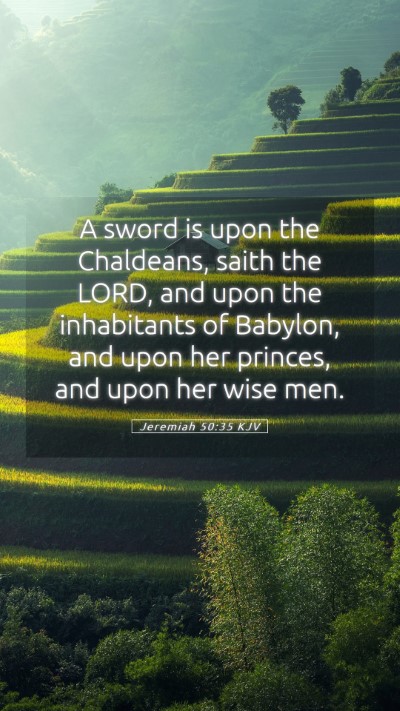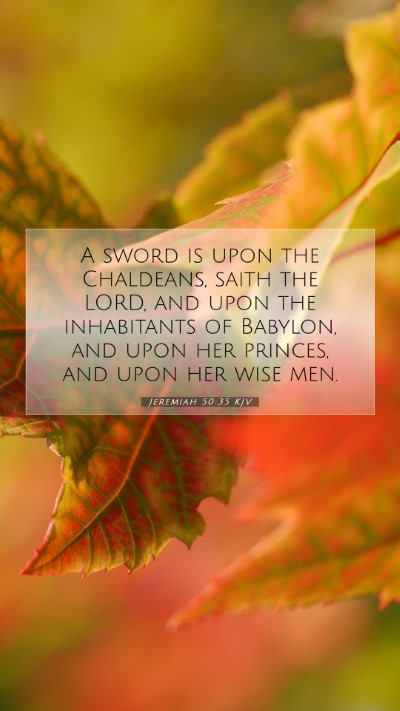Understanding Jeremiah 50:35
Verse: "A sword is upon the Chaldeans, saith the Lord, and upon the inhabitants of Babylon, and upon her princes, and upon her wise men."
Overview of Jeremiah 50:35
This verse is part of a prophetic message in the Book of Jeremiah, emphasizing the impending judgment upon Babylon and its leaders. The imagery of a "sword" symbolizes divine judgment and destruction, indicating not only physical violence but also spiritual bankruptcy. This serves as a warning and a reflection of God’s sovereignty over nations.
Bible Verse Meanings and Interpretations
- Divine Judgment: The "sword" represents God's active judgment against Babylon, indicating that God will intervene in human affairs and bring about justice.
- Targeted Impact: The mention of "princes" and "wise men" highlights that not just the common people but also the leaders and elite of Babylon will face consequences for their actions.
- Spiritual Implications: This verse serves as a reminder of the consequences of leading a nation away from God. It underscores the importance of godly leadership and wisdom.
Insights from Public Domain Commentaries
Matthew Henry's Commentary
Matthew Henry emphasizes the severity of God's judgment as depicted by the sword, which signifies destruction and the end of Babylonian pride. He elaborates on the futility of wisdom in the face of divine wrath, suggesting that earthly wisdom is inadequate against divine providence.
Albert Barnes' Notes on the Bible
Albert Barnes highlights that the pronouncement against Chaldeans reflects God's certain judgment against sinfulness. He discusses the characteristics of the sword as both a literal and metaphorical tool of judgment, elaborating that God's judgment is ultimately just and necessary for restoring righteousness.
Adam Clarke's Commentary
Adam Clarke interprets the verse within the larger narrative of Israel's restoration. He points out that this judgment is not simply for punishment but serves to clear the way for God's people to return to their land and to worship Him freely. Clarke's work emphasizes hope amidst judgment.
Application of the Verse in Today’s Context
- Understanding Justice: This verse can lead to reflections on justice and accountability in leadership, highlighting the importance of integrity in positions of power.
- Prophetic Literature: Studying this verse encourages deeper exploration of prophetic literature and how it applies to modern-day situations regarding governance and societal norms.
- Personal Reflection: Individuals can examine their lives in light of this verse, assessing areas where they might need to align more closely with divine principles.
Historical Context of Babylon
Babylon was a prominent empire known for its wealth, power, and idolatry. The historical background of this chapter reflects God's displeasure with Babylon's moral and spiritual corruption, and it's vital to understand this context for a fuller grasp of the text's significance.
Related Bible Cross References
- Isaiah 13:17-19: Prophecy against Babylon, highlighting the destruction and desolation that would fall upon it.
- Revelation 14:8: The fall of “Babylon the Great” symbolizes judgment against worldly powers.
- Jeremiah 51:20-24: Depicts God using Babylon as an instrument of judgment against Israel, which later faces its judgment.
Further Study Resources
For those looking to deepen their understanding, integrating this verse into Bible study groups or online Bible study lessons can be insightful. Utilizing Bible study tools and guides can further aid individuals seeking in-depth Bible verse analysis.
Conclusion
Jeremiah 50:35 serves as a powerful reminder of God's sovereignty and the importance of righteous leadership. The portrayal of judgment against Babylon can provide valuable lessons on justice, integrity, and the consequences of turning away from God. By reflecting on such verses, individuals can extract timely insights applicable to modern life dilemmas.


